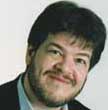
Jeff Jacoby
Down the slippery slope
http://www.NewsAndOpinion.com | "Certainly our decision today marks a significant change in the definition of marriage as it has been inherited from the common law and understood by many societies for centuries," wrote Chief Justice Margaret Marshall in the Massachusetts Supreme Judicial Court opinion finding a constitutional right to same-sex marriage. "But it does not disturb the fundamental value of marriage in our society."
That is either the most dishonest assertion in Goodridge v. Department of Public Health or the most naive. Either way, it is false.
Of course the most radical redefinition of marriage in centuries is going to have deeply disturbing consequences. It may be a decade or two before the full impact is evident, but some of the coming changes we can anticipate right now.
In the SJC's brave new world of gender-neutral marriage, the Commonwealth of Massachusetts will no longer communicate to its citizens that the central purpose of marriage is to bind men and women exclusively to each other and to the children that their sexual behavior is apt to produce. It will communicate instead that marriage was created to gratify grown-ups by reinforcing their committed romantic relationships. To be sure, a loving relationship is ideal in any marriage. But that isn't why every society in recorded history has defined marriage as an institution for linking the sexes.
Sooner than you think, it will become improper to speak of unique sex roles in family life. The meanings and status associated with words like "husband" and "wife" will be erased from the law; most likely, the words themselves will be replaced in statutes with the unisex "spouse," just as "father" and "mother" will give way to "parent." Two years ago, a private school in New York caused a stir when it banned celebrations of Mother's Day out of concern for the sensibilities of children being raised by gay parents. That was a tiny foretaste of what is now in store for Massachusetts — and perhaps the rest of the country too, if the Constitution's Full Faith and Credit Clause means what many experts say it means.
The redefinition of marriage will not end with same-sex weddings. In explaining its decision, the court says: "Without the right to marry — or more properly, the right to choose to marry — one is excluded from the full range of human experience and denied full protection of the laws for one's avowed commitment to an intimate and lasting human relationship."
But if that is true for committed gay and lesbian unions, it is just as true for every other committed but nontraditional union. Why shouldn't a man and two women, deeply in love and yearning to live as one, be permitted to marry? Or two family members — of the same sex or not — whose romantic love for each other is deep and lasting? If the opposite-sex limitation must yield to "the right to choose to marry," by what rational argument can the only-two-spouses or no-close-relatives limitations be sustained?
The SJC soothingly tells us that the Goodridge "plaintiffs seek only to be married, not to undermine the institution of civil marriage. . . . They do not attack the binary nature of marriage, the consanguinity provisions, or any of the other gate-keeping provisions of the marriage licensing law." Maybe not. But it is only a matter of time until other plaintiffs who also "seek only to be married" do challenge those provisions. And there will be no easy way to refuse them. Not after Goodridge.
Do you doubt it? Supporters of same-sex marriage dismiss concerns about polygamy and incest as slippery-slope nonsense. But as Justice Robert Cordy points out in his forceful dissent, the same was said of those who warned 25 years ago that if an equal rights amendment were added to the state constitution, it would eventually be used to mandate homosexual marriage.
Cordy writes that in the Boston newspapers, "claims that the ERA might be the basis for validating marriages between same-sex couples were labelled 'exaggerated' and 'unfounded.' " On Nov. 1, 1976, the Boston Globe editorialized in favor of the amendment. "Those urging a no vote," it declared, "argue that the amendment would . . . legitimize marriage between people of the same sex . . . In reality, the proposed amendment would require none of these things."
The Globe offered similar assurances during the legislative battle over a gay-rights law. "The bill does not legalize 'gay marriage' or confer any right on homosexual, lesbian, or unmarried heterosexual couples to 'domestic benefits," insisted a Globe editorial in 1989. "Nor does it put Massachusetts on a 'slippery slope' toward such rights."
But the critics were right. The court's opinion in Goodridge relies in part on that very gay-rights law, while Justice John Greaney's concurring opinion — which provided the fourth and decisive vote in the case — begins by citing the Massachusetts ERA and argues that a ban on same-sex marriage is "self-evident" sex discrimination.
Goodridge "is a reminder not to pooh-pooh slippery slope arguments," says UCLA law professor Eugene Volokh, who supports same-sex marriage. "In a legal system built on analogy and precedent . . . the slippery slope can be a very real phenomenon — which is to say that a proposed new legal rule may end up having indirect effects far beyond its own narrow scope."
Slippery slopes can be slippery indeed. If that was true of the ERA and gay-rights law, it is manifestly true of Goodridge. Four Massachusetts justices set off a cataclysm this week. We will be feeling the aftershocks for a long time to come.
Like this writer's work? Why not sign-up for the daily JWR update. It's free. Just click here.
Jeff Jacoby is a Boston Globe columnist. Comment by clicking here.


